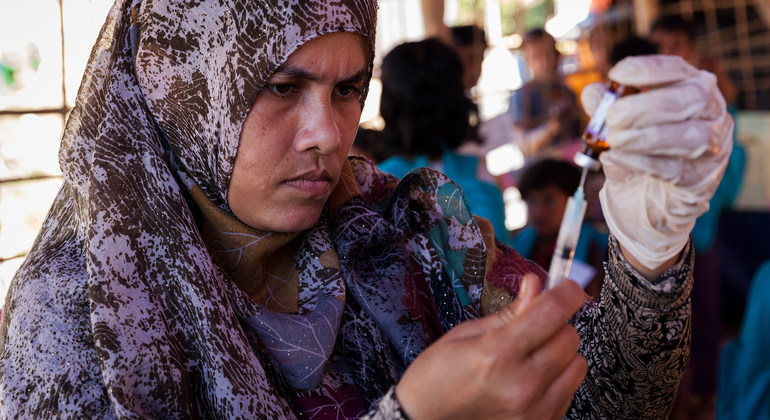As soon as vaccines are licensed for use, the world will need as many syringes as doses of vaccine, said UNICEF on Monday.
To begin preparations, this year, UNICEF will stockpile 520 million syringes in its warehouses, part of a larger plan to have a billion syringes ready for use through 2021, to guarantee initial supply and help ensure that syringes arrive before vaccines are distributed.
During 2021, assuming there are enough doses of COVID-19 vaccines, UNICEF expects to deliver around a billion syringes to support COVID-19 vaccination efforts on top of the 620 million syringes the agency will purchase for other vaccination programmes, against other diseases such as measles, typhoid and more.
Historic undertaking
“Vaccinating the world against COVID-19 will be one of the largest mass undertakings in human history, and we will need to move as quickly as the vaccines can be produced,” said Henrietta Fore, UNICEF Executive Director.
“In order to move fast later, we must move fast now. By the end of the year, we will already have over half a billion syringes pre-positioned where they can be deployed quickly and cost effectively. That’s enough syringes to wrap around the world one and a half times.”
In line with the longstanding collaboration between the two partners, the global vaccine alliance Gavi, will reimburse UNICEF for the cost of syringes and safety boxes, which will then be used for the COVID-19 Vaccine Global Access Facility (COVAX Facility) and for other Gavi-funded immunization programmes, if needed
‘Safety boxes’ for disposal
Besides syringes, UNICEF is also buying 5 million safety boxes so that used syringes and needles can be disposed in a safe manner by personnel at health facilities, reducing the risk of needle stick injuries and blood borne diseases.
Every safety box carries 100 syringes. Accordingly, UNICEF said it was “bundling” the syringes with safety boxes to ensure enough safety boxes are available to go along with the syringes.
Injection equipment such as syringes and safety boxes have a shelf life of five years, the agency notes. Lead-times for such equipment are also long as these items are bulky and need to be transported by sea freight. Vaccines, which are heat sensitive, are normally transported more quickly by air.
As the key procurement coordinator for Gavi, UNICEF is already the largest single vaccine buyer in the world, procuring more than 2 billion doses of vaccines annually for routine immunization and outbreak response on behalf of nearly 100 countries. Every year,
UNICEF provides vaccines for almost half of the world’s children and procures and supplies around 600-800 million syringes for regular immunization programmes.
Huge increase
COVID-19 vaccines will likely treble or quadruple that number, depending on the number that are ultimately produced and secured by UNICEF.
“Over two decades, Gavi has helped an additional 822 million children from the world’s most vulnerable countries access critical, life-saving vaccines”, said Seth Berkley, CEO of Gavi. “This would not have been possible without our partnership with UNICEF, and it is this same collaboration that will be essential to Gavi’s work with the COVAX Facility.”
To make sure that vaccines are transported and stored at the right temperature, UNICEF, along with the World Health Organization (WHO), is also mapping out existing cold chain equipment and storage capacity – in the private as well as public sector – and preparing necessary guidance for countries to receive vaccines.
“We are doing everything we can to deliver these essential supplies efficiently, effectively and at the right temperature, as we already do so well all over the world,” Ms. Fore said.
Even prior to the COVID-19 pandemic, with support from Gavi and in partnership with WHO, UNICEF has been upgrading the existing cold chain equipment across health facilities in countries to ensure that vaccines remain safe and effective throughout their journey.
Fridges boost health services
Since 2017, over 40,000 cold-chain fridges, including solar fridges, have been installed across health facilities, mostly in Africa, said the agency.
And in many countries, UNICEF is promoting solar technologies to help countries maintain supply chains.
In South Sudan, the least electrified country in the world, where temperatures frequently exceed 40 degrees Celsius, more than 700 health facilities have been equipped by UNICEF with solar power fridges – around 50 per cent of all facilities nationwide.



